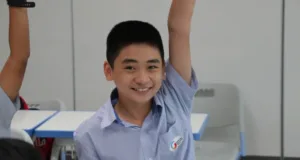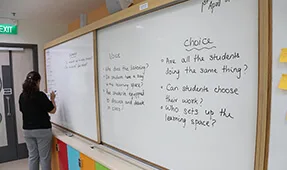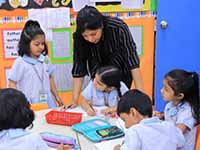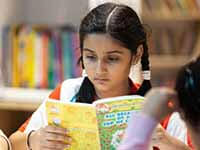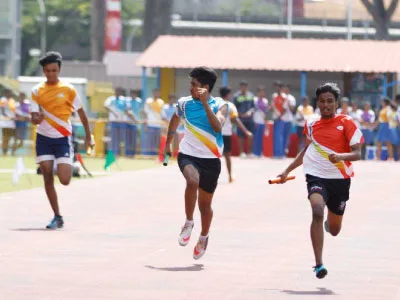Critical thinkers are very important in today’s day and world. It is almost becoming a prerequisite to being a critical thinker.
More so in dynamic and diverse environments where nothing is constant, but change is the only constant.
Hence, it becomes important to develop critical thinking skills in children from a young age.
Best Singapore Preschool understand the importance of critical thinking and ensure it is imparted to children through a well-designed hands-on curriculum.
At What Age Should Critical Thinking Be Taught?
Critical thinking skills are mostly about having the ability to analyze, imagine and evaluate data, information to understand its correlations, integrity, how to apply it across sections and knowledge, and understand its validity.
Seeing it as a life skill, to understand what is factual and what is bogus helps humans make relationships, apply varied knowledge to different disciplines and benefit from the same.
The age-appropriate to help your child think out of the box, be critical is very young.
It is also possible that an infant is able to process information that is perceived by them through interactions with elders.
However, to inculcate critical thinking skills for preschoolers, it’s important to start as early as kindergarten in one of the best schools in Singapore.
What Are The 5 Critical Thinking Skills?
1. Identification
Identification is the first step to critical thinking. One must be able to identify the problem or equation to come to a further process.
Identification also involves understanding different aspects, situations, and citations. It also applies to identifying when there is no problem, the benefits, what is working, and why.
● Who is doing what?
● What is the causation of the given aspect or problem?
● What are the final results or predictable results and what can change them?
2. Curiosity
Curiosity is important to build even if all are not born curious. It is a skill that can be worked upon and learned over a period of time.
Just start asking questions and wonder why something is a certain way and what can be alternate scenarios.
Once you start asking open-ended questions you will be able to instill curiosity and make it a motor, reflex moment of truth.
3. Research
Research is an important concept when trying to persuade a client or even being curious about something.
Research helps to develop a thinking mind using both the right and left parts of the brain. With adequate research, one can persuade, understand facts and figures and get an unbiased answer.
To improve your research skills use your mind to crack situations through finding, reading, comparing etc.
4. Considering Biases
As human beings we are surrounded by biases, biases about our favorite food, biases about our political schemes, agendas, biases that come into play in every segment of society.
It is important to understand that biases exist and what position do we play, also look at our own biases and unlearning, relearning constantly.
● Who does this help?
● Does the basis of this data appear to have a plan?
● Is the source dismissing, flouting or vacuuming out information that doesn’t support its convictions or claims?
● Is this conception using unnecessary vocabulary to persuade an audience’s perception of actuality?
5. Relevance Determining
Even with the best tools, you may end up thinking critically about a chunk of data that is irrelevant to your position, thus it is important to understand the relevance of what is required, why it is required and who is the audience.
If one is able to establish context and then extract and make use of information as knowledge, then the relevance determining has been successfully done.
To better test this, put your skills of critical thinking at use in different situations and see what context you form and if it is correct.
Which Is The First Step In Critical Thinking?
The first step in critical thinking for a child is to know everything and be provided with that information they are curious about apart from being able to provide the information they are not particularly looking at.
Children by nature are mostly curious as they are trying to make sense of the world.
When they ask questions, do not shun them out, but find answers that help them make sense of the world as is. Try to be truthful in a way that they understand what you are implying.
What Are The 3 Stages Of Critical Thinking?
Stage-1: Comprehension
Comprehension is the first stage of a good critical thinker.
He/ She/ They must be able to comprehend things in their own way but correctly and uniformly. This means they will have to make sense of a chunk of data, choose what is necessary and work with that.
Comprehension is similar to identification such that once you identify, you can comprehend the data or project or material of information that is raw to become a critical thinker.
Stage-2: Analysis
Every critical thinker has to analyze raw data to make sense of it, draw parallels, intersect it and understand it from a varied lens.
It is important that if your child is becoming a critical thinker, they are allowed to and encouraged to analyze data and visualize it in their own time, space and understanding.
Do not force expectations or results on them as this hampers the analysis part.
Stage-3: Evaluation
Evaluation finally becomes the step after processing the information where one critical thinker evaluates and juggles, and reaches a conclusion of a particular situation.
The evaluation process also involves checking all the facts and figures, re-evaluating and understanding the process, figuring out gaps and interlocking disciplines to come to a favorable or unfavorable end to a particular topic.
What Are The 7 Principles Of Critical Thinking?
1. Encourage Children To Ask Questions
Because children are usually unbiased, they are curious to know what is happening around them, making this a form of understanding in an environment where they are free to ask questions without any fear or obstruction.
Open communication is important to develop a critical thinker and it is a great way to improve critical thinking skills in children.
2. Do Not Expect Children To Follow Blindly
When children are finding their own paths and exploring, they are bound to tumble, at this stage do not expect them to follow your traditions, values, understandings and teachings blindly.
They will often stray to find a path of their own.
3. Play With Your Child
There is nothing better than playtime to inculcate critical thinking in your child.
During play, present the child with problems that they can then struggle with and come to conclusions, crosswords, outdoor interaction are all important parts of critical thinking.
4. Encourage Thinking In New And Different Ways
Often because we are stuck in a thinking pattern, we expect the same out of our child.
But the more divergent and open-minded we are, the more a child will learn from new and different ways to excel in a similar situation.
5. Ask Open-Ended Questions If You Want Your Child To Become A Critical Thinker
Asking objective questions is often helpful but moot when trying to help your child become a critical thinker.
Open-ended questions have a more expanded playing field and are open to interpretation and ideas that help a child build critical thinking skills.
6. Help Your Child Reach A Hypothesis
Asking questions like how will this affect the outcome or how do you think can we solve this or what do you think is the situation here are some great ways to help your child build a hypothesis.
7. Don’t Intervene At Every EBB And Flow
Children are bound to come across problems and hurdles. As parents, it is instinctive to become the rescuer.
But, at times let your child grapple with the situation and stand up for themselves assuming responsibility and accountability.
What Are Some Critical Thinking Activities?
To sum it up, inculcate habits like reading, interacting socially, finding solutions as well as problems and being curious.
Play games to improve critical thinking in kids which will help boost the child’s confidence while helping them become critical thinkers.
It is important you make your child understand the importance of diversity, divergence and out of the box ideas all helpful to become critical thinkers.
Industries like User Experience Research and Design are thriving on critical thinking.
Schools that follow Curricula like the IBDP Diploma, IGCSE and CBSE have well-curated programs that aim at critical thinking development as one of the key skills that a student should acquire.

